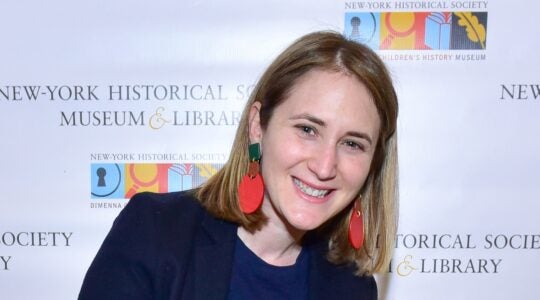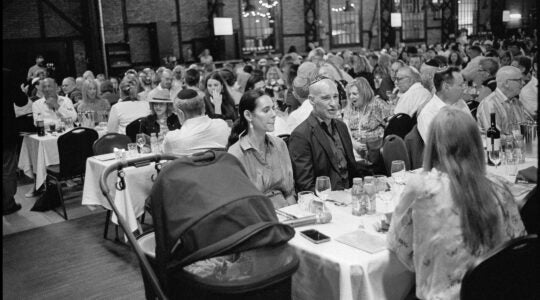The courtroom light switches off, the overhead projector flicks on. And once more, the prosecutor speaks dryly of checks, contracts and budgets as the documents are projected on screen to the jurors. There are checks from the Council of Jewish Organizations of Boro Park — then Brooklyn’s largest Jewish community council — and its spinoffs to the political coffers of Brooklyn Assemblyman Dov Hikind, and other political campaigns.
There are government contracts sponsored by Hikind and awarded to the council for social service programs.
There is a COJO check to a caterer who says the money helped pay for the wedding of a Hikind relative. There are several more from the council to a school whose bookkeeper says the checks helped pay for the tuition of Hikind’s children. And there are checks as well to various Hikind family members, staffers and their relatives for purposes that, as yet, remain unclear.
Two weeks into the federal trial of Hikind and his codefendant, COJO deputy director Rabbi Elimelech Naiman, it is clear that the prosecutors’ star witnesses are pieces of paper. The charges against the two — conspiracy, fraud and embezzlement — rest largely upon a blizzard of documents whose verification and explanation fall to witnesses who seem more like a supporting cast.
At least at this stage of the trial in Brooklyn, the defense lawyers — two of the most prominent white-collar-crime attorneys in New York — seem intent on reframing these documents, or at least mitigating their impact. All of the COJO officials’ efforts, the attorneys stressed, were taken in the context of their overall struggle to meet burgeoning social needs.
But even one of the lawyers for Naiman seemed to acknowledge the uphill battle his side faces.
As Benjamin Brafman’s questioning wore on with frequent emphasis on COJO’s worthy work, Judge Charles Sifton chided him continually to make his points quickly and clearly.
Sifton, who has had several clashes with Brafman, warned him in a sidebar that his often meandering questioning was creating “an unfavorable impression concerning the reliability and importance of the information you’re seeking to get out.”
“I’m concerned you may not be doing the best job you can for your own client,” an openly exasperated Sifton told him.
“Given what I have to work with,” Brafman retorted, “I think I’m doing a terrific job for my client.”
Meanwhile, COJO bookkeeper Esther Jacobs testified last week about checks from COJO affiliates made out to Hikind, his brother Moshe and several Hikind staffers or associates. She said she did not know what work, if any, they did for the agency.
During cross-examination, Hikind’s attorney, Gustave Newman, elicited from Jacobs that former City Council President Andrew Stein and cosmetics billionaire Ronald Lauder had given COJO some $80,000 for a major voter registration drive in 1992-93. And Jacobs, who was testifying under a grant of immunity, acknowledged that the disbursements in question were probably related to that campaign.
That could make it a legitimate expense of private, not government, funds.
With some prodding from Newman, Jacobs said the tipoff was that the check stubs for these disbursements were marked by asterisks. Naiman, she recalled, had assigned her to figure out how much of the privately donated voter registration money was left; the asterisks were likely markings by her to add up what had been spent.
But in followup questioning from Assistant U.S. Attorney Elisa Liang, Jacobs conceded that one of the marked check stubs was for $500 made out to Hikind before the voter registration funds from Stein or Lauder ever arrived. Another stub, she acknowledged, was for a $1,900 check made out in August 1993 to Yeshiva University, an institution no one claimed was part of the drive.
“I don’t know if the voter registration project was still in effect at this time, or if [the asterisk] meant something else here,” said Jacobs. “I’m not sure.”
Lillian Bellows, a bookkeeper for the Yeshivah of Flatbush, testified later that other unexplained COJO checks totaling $12,500 were sent to her school in response to tuition billings for two children of Hikind and a child from another family, named Ben-Asher. “I posted this to the Hikinds’ account,” she said.
During cross-examination, Newman introduced a 1996 letter to the school from Hikind’s wife, Shani, sent after the federal investigation into Hikind had been launched. In the letter, Shani Hikind enclosed a personal check for $4,500, explaining that she had recently learned that money from a third party was “mistakenly” credited to her account. She requested the sum be used for a scholarship for a needy child.
This week, another COJO employee, Esther Kazelnick, testified that she wrote personal checks to the campaign committees of two U.S. senators in 1992 after her boss, COJO operations director Paul Chernick, promised a COJO affiliate would reimburse her. It is against the law for charities to contribute to partisan political campaigns. Political donations with third party reimbursements are also illegal. The checks — $750 to Sen. Joseph Lieberman (D-Conn.) and $500 to Sen. Alfonse D’Amato (R-N.Y.) — were submitted as evidence.
Kazelnick also said that Program Development Resources, a consulting firm owned by Chernick that received virtually all of its funds from COJO or its affiliates, donated $15,000 in 1991 to the Republican National Committee. Check stubs submitted as evidence indicated that the sum was meant to qualify Naiman and Chernick to become members of the GOP Eagles, an elite group of Republican donors. In a memo introduced by the prosecution, from Naiman to a GOP official, Naiman described himself as PDR’s vice president.
Last month, Chernick, who was to stand trial with Hikind and Naiman, pleaded guilty to paying off Hikind and to other fraud and embezzlement charges. But under federal court rules, the prosecution may not refer to his plea before the jury. Hikind and Naiman, if convicted, could face up to 10 years in prison.
In a lengthy cross-examination, Naiman’s attorney, Brafman, elicited testimony from Kazelnick that Chernick had borrowed from his retirement funds to help COJO on two separate occasions when COJO was having problems meeting its payroll.
Kazelnick also agreed when Brafman declared that Chernick “would reach out to every government official he could find who had a say in the [legislative] process” to obtain funding for COJO programs.
Brafman also introduced COJO documents showing that Hikind was but one of several state legislators who sponsored appropriation requests for the group.
The New York Jewish Week brings you the stories behind the headlines, keeping you connected to Jewish life in New York. Help sustain the reporting you trust by donating today.




